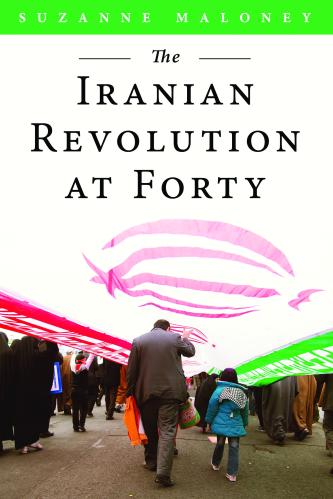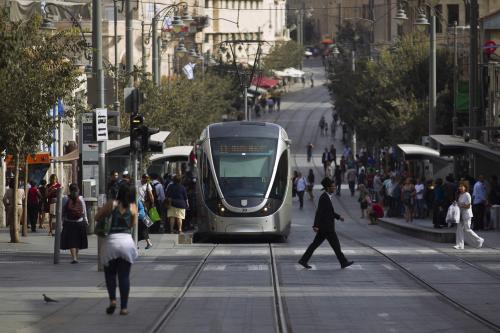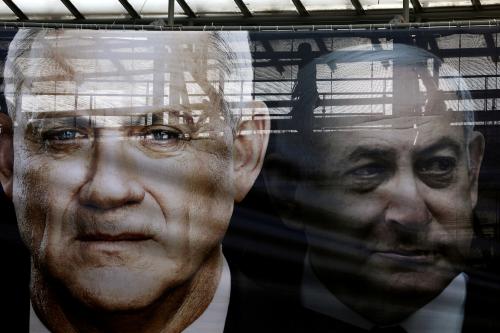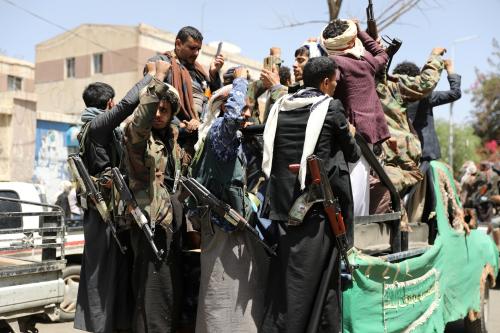The novel coronavirus pandemic will shape the politics and economics of the Middle East in both the immediate and long term. As the pandemic’s repercussions will be felt far beyond public health, many of the dynamics that were set in motion before this crisis will be accelerated by its onset. While Israel closely watches the side effects of the pandemic as they evolve into potential security threats, it should also keep an eye on the opportunities for regional cooperation and stabilization that arise as its surrounding landscape changes.
Numerous countries in the region were knee-deep in multi-faceted crises long before the virus erupted. The status quo in the majority of the Middle East — poor economic conditions, an influx of immigrants and refugees, violent civil wars and internal conflicts, failing and corrupt bureaucracies — has evolved into a landscape with threats and opportunities alike. When it comes to the pandemic, the feeble governments and authoritarian regimes in the region have a strong political incentive to hide the truth from their constituents and the rest of the world. Many cannot collect the relevant data and make sense of it. This is a major handicap that will impair any capability to handle the pandemic and allocate (almost non-existent) resources to keep their countries afloat.
A new Middle Eastern trajectory?
Iran and Iraq:
Iran, already reeling under tough sanctions and historic unrest, was one of the first countries worldwide to experience a widespread outbreak. It became a hotspot largely due to its close economic ties with China and Tehran’s rampant mismanagement. Officially, the Islamic Republic reports over 76,000 cases and more than 4,700 fatalities, but health experts assess the real numbers to be far higher.
There are many questions surrounding the pandemic’s fallout for Iran’s stability, and how the accelerating economic recession will impact Iran’s so-called “Shia crescent” strategy, regional expansion, nuclear aspirations, and covert war with the United States and Israel. On one hand, the coronavirus outbreak might be an opportunity for the regime to quell internal turmoil while the world — and especially the U.S. — is distracted. On the other, it accelerates Iran’s already profound troubles, pushing Tehran to possibly negotiate with the U.S. Indeed, Iranian economists have warned President Hassan Rouhani that the economic contraction the virus has brought may ignite new unrest. U.S. allies will have to carefully assess the situation and decide whether to maintain maximum pressure or dial down sanctions in an effort to help relieve the human toll of the pandemic in Iran.
Severe budget constraints and public dissatisfaction make Iran less likely to engage in a frontal confrontation with the United States and Israel, and even Saudi Arabia, at this time. It seems that for now, Iran has slowed down Quds Force activity in Syria and Iraq, and Qassem Soleimani’s successor is far from filling his shoes. Iran has not abandoned its aspirations, but it has allocated fewer resources in the last month to some of its malignant projects on Israel’s border, namely the precision missile supply chain to Hezbollah and the Palestinian Islamic Jihad. Of course, such circumstances will change over time, and Israel is watching closely.
In terms of intelligence and national security, Israel should focus on Iran’s breakout time for a nuclear weapon. Iran is still clinging to the prospect of European Union financial support and is pushing a concerted public relations campaign in the hopes that the U.S. may ratchet down its crippling sanctions regime. Tehran will walk a thin line, keeping what is left of the Iran nuclear deal while pushing forward advanced centrifuge R&D and increased production of its low-grade uranium enrichment stock. Israeli intelligence is concerned about an Iranian nuclear breakout that might be overlooked during the struggle with COVID-19 worldwide. In that case, Israel’s intelligence community perceives that Israel, again, would have to carry the load of stopping Iran. The resources that would require, in the coronavirus era, would be more than Israel can manage alone.
Next door, the American presence in Iraq is a thorn for Iran. Iran-backed Shiite militias will continue to fire rockets on American soldiers and coalition forces during the pandemic and push the administration to retreat, gradually but consistently, into distant pockets in the autonomous Kurdish region of northern Iraq and Sunni-populated areas in western Iraq. The Gulf Cooperation Council states, in particular, will watch this trend closely, as well as watch to see how the administration balances its red line on American casualties as the toll of the domestic crisis in the U.S. presses on.
Iran is calculating that the Trump administration is less likely to retaliate significantly as the pandemic rages on U.S. soil. Amid fear of infection within American troops in Iraq, the U.S. is already decreasing cooperation with local Iraqi allies. In recent weeks, the U.S.-led coalition has pulled troops out of six Iraqi bases in the face of mounting threats, something Tehran is sure to cheer.
Egypt, Jordan, Gaza, and the West Bank:
In March, Israel was not only concerned about its domestic struggle with the pandemic, but also the outbreak of the virus in neighbors Jordan and Egypt. High infection rates and death tolls in those countries would present a major threat to the stability of their regimes. It would be devastating for Israel to have additional fronts to shield, on top of Gaza to the west and Syria to the north. So far the number of confirmed cases in both countries is apparently low (around 2,500 cases altogether), which is a major relief in Jerusalem.
On the Palestinian front, Israel is stuck between a rock and a hard place when it comes to addressing the pandemic internally and preventing it externally in the West bank and particularly Gaza. Will tensions rise as the pandemic spins out of control? (The head of Hamas in Gaza, Yahya Sinwar, threatened that if breathing machines are not brought to Gaza, his group will “stop the breathing of six million Israelis.”) Or is it an opportunity for mutual understanding and responsibility?
The prospect of a health disaster in Gaza is not far-fetched. Israeli decisionmakers are shrugging aside this nightmare scenario for now, given the more “immediate” concerns such as political coalition-building and rising infection rates inside Israel. In the West bank, elements of pre-existing security cooperation between Israel and the Palestinian security forces are actually expanding into more social, medical, and humanitarian avenues. A silver lining in the Israeli-Palestinian conflict? Maybe, if Israel plays it right and uses the pandemic to draw Hamas closer into a long-term cease-fire (a hudna).
Under the pretext that Hamas fears the infection of its members in Israeli jails, talks have begun for a prisoner release in exchange for two Israeli civilian captives and the bodies of two soldiers killed in action and held by Hamas in Gaza. These talks revive a dialogue considered dead for almost six years. The concern that Hamas or the Palestinian Authority might take advantage of the pandemic to escalate in order push their cause did not materialize. Preempting such scenarios, the Israeli Defense Forces (IDF) deployed forces across borders and increased cooperation with the Palestinians to flatten the curve of the pandemic in their territory. The cooperation seems successful so far, with Gaza and even Hamas leadership acting pragmatically.
Lebanon and Syria:
The coronavirus caught Lebanon in the midst of a political, economic, and social crisis. Hezbollah is set on taking advantage of this opportunity to project Shiite dominance in the country by flaunting Hezbollah activists with medical supplies and ambulances. While branding himself as a “savior,” Hezbollah leader Hassan Nasrallah has difficult choices to make with depleting Iranian funds. Nasrallah will have to focus more on the COVID-19 front than on the strategic missile precision campaign — in other words, fewer missile R&D workshops and more infirmaries. This might create a situation where Israel’s “Northern Threat” scenario is less likely to pan out, at least in the medium term. Good news for Israel? Probably yes, yet something to watch, since Hezbollah’s strengthened stronghold on Lebanon is bad news for Jerusalem.
In Syria, the regime is still receiving advanced missiles and weapons by air from Iran, and Iran wants to produce chemical weapons to refill Syria’s depleting stockpiles. Early in March, Israel allegedly struck a chemical warfare facility near the city of Homs. With Iran under extreme pressure due to the coronavirus — and with fewer resources at its disposal as a result — Tehran might resort to more extreme measures such as the use of chemical weapons, albeit on a limited scale. Syria is a key country in the production and deployment of weapons, mostly by air, across the Israeli border. With the pandemic distracting the international community, its vigilance on these developments is not a given.
Some analysts propose that Israel should explore ways to assist the Assad regime and the millions of refugees in Syria with medical supplies and expertise, albeit discreetly. In the background is a robust theory that Syria was first exposed to the virus by unchecked Iranian militants and pilgrims. While not just a humanitarian mission, this presents an unprecedented opportunity for Israel to engage in a potential dialogue with the Syrian regime and build trust. Vladimir Putin and Bashar Assad are not entirely enthusiastic with Iran’s growing presence in Syria and at some point Moscow may pressure Tehran to leave. Once Israel has its coronavirus cases under control, aiding Syria should be seriously considered.
Saudi Arabia and the United Arab Emirates:
The Gulf’s economic uncertainty has been further exacerbated by the plummeting demand for oil. The crisis among the OPEC+ group and the diplomatic fight between Russia and Saudi Arabia triggered the price of oil to fall by more than half since March, as widespread lockdowns in Europe and North America have slashed oil demand. Unprecedented as it may be, the recent deal struck between Saudi Arabia and Russia with other major oil producing nations to cut production as they attempt to stabilize the oil market is thought to be insufficient to offset the loss in demand.
For Saudi Arabia and other producers like Iraq, Algeria, Qatar, the United Arab Emirates (UAE), and Kuwait, this is a major blow. Also affected by this crisis are states that rely on Saudi Arabia, Qatar, and UAE for their economic survival — such as Egypt, Jordan, and the Palestinian Authority, which might be left without the economic safety net from oil-rich allies. This is also very bad news for Tehran, which was trying to keep its head above water by smuggling some oil, and the price drop has made its cost of production higher than the sale price. Meanwhile, there is no sanctions relief in sight. Overall, with much of the region’s economy dependent on the energy market, the post-pandemic recovery for most if not all of the Middle East will likely be slow and painful.
The crisis could provide Israel the opportunity to enhance its relationship with the Gulf Cooperation Council. According to media reports, in late March Israel’s foreign intelligence service obtained coronavirus testing kits from Gulf states that have a discreet and informal relationship with Israel. Israel has fostered these relationships for many years over issues of regional and national security, as well as counterterrorism. In turn, Gulf states have courted Israel’s technology and cybersecurity capabilities for many years to fortify their national security and regime stability. Israel was eager to expand its relationships in the Gulf, but limited access to its more high-end technologies.
As the pandemic presses on, Gulf states will have to reexamine their immigration and border access policies, especially vis-à-vis Iran. In turn, they will expect Israel to support their causes and perhaps provide additional expertise and hardware. Israel will need to reexamine its technology export policy and manage the risks it entails, especially regarding intellectual property. The coronavirus crisis provided a litmus test for Israel’s relationship with Gulf states, but expanding those relationships increases Israel’s commitment and Gulf states’ expectations that Israel will address their future needs.
What to watch
Overall, the pandemic’s impact on Israel’s regional situation is not clear-cut. While the coronavirus pandemic caught Israel and the Middle East exposed and unprepared, so far Israel’s regional landscape has not changed drastically and it has been able to control the outbreak domestically. Indeed, one study of global pandemic data has ranked Israel first in terms of COVID-19-related safety.
In the background lies a major setback in Israel’s preparedness for the next war and its “campaign between the wars.” The IDF will now postpone its long awaited five-year reform named “Momentum.” With the IDF taking a major part in the battle against the pandemic and the reshuffling of resources, this crucial initiative will remain on the drawing board.
In many respects, Israel’s cooperation with neighbor countries has increased, and coordination with the Palestinians — Hamas and the Palestinian Authority alike — is increasing and stable. The pandemic has also given rise to new opportunities on the foreign policy front. The Gulf countries have shown solidarity, some of Iran’s activity in Syria is on hold, and Hezbollah is stretched thin in Lebanon. Still, the volatile Middle East is not in the clear from the pandemic and its burgeoning side effects. While Iran is struggling domestically, it has not abandoned its regional aspirations, and the potential for further military aggression, “shadow war” activity, or a nuclear breakout are still the main threats that Israel and the U.S. should watch.








Commentary
Israel’s changing regional landscape in light of COVID-19
April 17, 2020